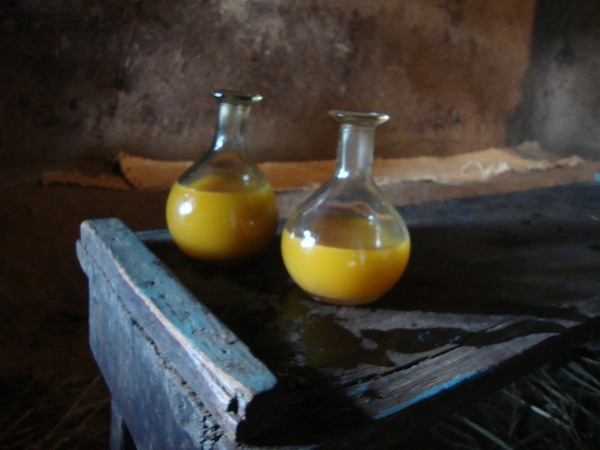Often Tej is called Drink of the Kings. Tej is a national alcoholic drink of Ethiopia made by the fermentation of honey mixed with water and Gesho (Rhamnus prinoides), and flavored with a variety of spices. It is a type of mead or honey wine.
Nowadays anybody, irrespective of social rank, can undertake the preparations of Tej either for consumption or commercial purposes. But it seems that this was not possible in the past. A person of 87 years of age by the name of Mr. Welde Maryam said: “Particularly in the days of Emperor Menilek II and previously and for some time during Queen Zawditu’s reign, the only place where Tej can be prepared was only in the Royal Palace. The making of Tej was a privilege that was reserved for the Royal household. No other person could make it without special permission. The Ras and Deja Azmach( Governor and Generals) were granted permission to prepare Tej either for special occasions such as marriages, banquets, or for everyday use.

“Persons of high social standing in the middle class could obtain permission only for special and rare occasions such as marriage days. If a person was caught making Tej without the permission and approval of the government, he was liable to a heavy fine and a long term of imprisonment.
“In spite of these legal consequences, however,” he continued, “citizens practised the making of Tej secretly. Towards the end of Menilek’s reign, the secret preparation of Tej for commercial purposes was widely spread. A person who wanted to buy Tej most often will be asked for it in a secret manner”.
I have asked other elderly people about the truth of this prohibition and found varied opinions concerning its date and effectiveness. Some said that the prohibition was effective only before Menilek II. Others assert that even during Menilek II’s reign it was effective. However, in spite of these varied opinions, my informants agreed that custom and tradition forbade ordinary persons to make taj.
Two different reasons are given for this restriction. The first is based upon the social hierarchy. The making of Tej signifies high social rank, so to signify that ordinary people are in a lower social position than the king and the noblemen, they were not allowed to make Tej. The second reason given is that the king and the feudal lords used to serve Tej to their soldiers and retinues on great occasions at banquets. For this purpose, they required an unfailing supply of honey, and so, to ensure a constant supply of it, the ordinary people were not permitted to make Tej.

Unfortunately, due to the lack of documentary evidence, I cannot state when the prohibition ceased. But it is certain that after 1920 Tej was prepared openly for sale as well as for use at home.
However, the social significance of Tej has not changed. Nowadays, just as in the past, Tej is always found in tradtional ceremonies, weddings, and the houses of the well-to-do traditionalists. Especially in traditional restaurants and Special Tej Bars. At present, Tej is the highest in the gradation of Ethiopian beverages. Its presence always signifies wealth and a high social status.

An aged man when asked about the use of drinking Tej answered in these words:
“Tej purifies the blood, beautifies the appearance and gives strength.” Such was the common belief about the results of drinking Tej in the past. Because of these expected good results from Tej many persons, especially noblemen, made it a habit to drink Tej in the morning, in the afternoon and in the evening. At breakfast they purposely took salty food, e.g. salted fried or salted dried meat so that they were thirsty and would consume a lot of Tej.
There are two interesting facts that we should mention as regards to Tej in the old days. Custom and tradition did not allow a woman to drink Tej in public. At least in order that she might not get drunk. Secondly, when Tej was offered and relative, traditional etiquette demanded that the person serving should pour a small quantity of Tej in his hand and taste it as he offers the guest.

